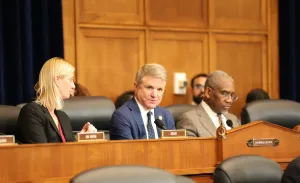Chairman McCaul Delivers Remarks on Landmark Bill Promoting Public-Private Conservation Partnership
Washington, D.C. - Today, House Foreign Affairs Committee Chairman Michael McCaul delivered the following remarks at a committee markup on various measures to discuss H.R. 6727, which would establish the United States Foundation for International Conservation and promote robust, long-term conservation efforts between America's public and private sectors. In his remarks, Chairman McCaul highlighted Republicans' historical commitment to conservation – dating back to President Roosevelt – and the need to undercut malign actors like Russia and the Chinese Communist Party (CCP) which tacitly profit from illicit hunting.
– Remarks as delivered –
As the chairman of this committee, I have had the opportunity – as most of us have – to travel around the world to see the importance of wildlife conservation firsthand.
I have also watched international criminal organizations devastate communities for their own gain. China specifically is one of the world's largest markets for illegal wildlife trafficking.
Criminal gangs slaughter rhinos for their horns, leopards for their pelts, and turtles for their meat.
They sell these products in Chinese black markets – often with the full support of the Chinese Communist Party. And they use the profits to fund human trafficking, illegal drug trade, and other malign activities.
This bill enhances environmental protection and builds on my work in conservation. This bill also pushes back against the CCP's malign influence and international criminal elements.
I was the co-author of the bipartisan Plastics Act, which removed plastic from our oceans that is devastating marine life.
That is why I am proud to be the author of this bill, the Foundation for International Conservation Act.
This is a bipartisan bill, with bicameral support, that I think – most interestingly – harvests the power of private philanthropy in a 2-to-1 ratio of private-to-public spending.
Never in my career have I had ten billionaires come to me and say, "Sir, we want to put our money to work with the [U.S. government] to work on such an important cause."
And I have strongly advocated – and believe there will be – a 100 million dollar offset in appropriations language, so that would mean – upon enactment – there would be no new costs to taxpayers.
Some of the top priorities of the bill include the conservation of endangered species in Africa; marine life in places such as the Galapagos and beyond; and the rainforests – the lungs of our planet – in the Congo, Indonesia, and the Amazon.
This legislation has received tremendous support from sportsmen groups like Ducks Unlimited and the Houston Safari Club to conservationists like the World Wildlife Fund and Nature Conservancy.
However, this foundation is more than leveraging the power of private contributions – it is a diplomatic investment in the U.S. foreign policy toolkit that none of our adversaries can replicate.
Russia and China benefit from instability. Putin profits on the gold and minerals they mine, while native forests from Siberia to the Solomon Islands are being exploited to feed Chinese timber markets.
This bill will counter the growing CCP influence in these regions. Wildlife trafficking is a criminal enterprise that often emanates from China – with tacit approval from the CCP.
In dollar value, illegal, unreported, and unregulated fishing costs the global economy as much as 23 billion dollars per year.
This legislation will fight the CCP's environmental destruction, bring stability to local communities, and conserve wildlife, forests, and fisheries.
Conservation has a critical role in protecting sensitive ecosystems and our environment.
It has been championed by Republicans for over a century, all the way back to Teddy Roosevelt. So, I am pleased to see bipartisan support on this critical measure.
###
